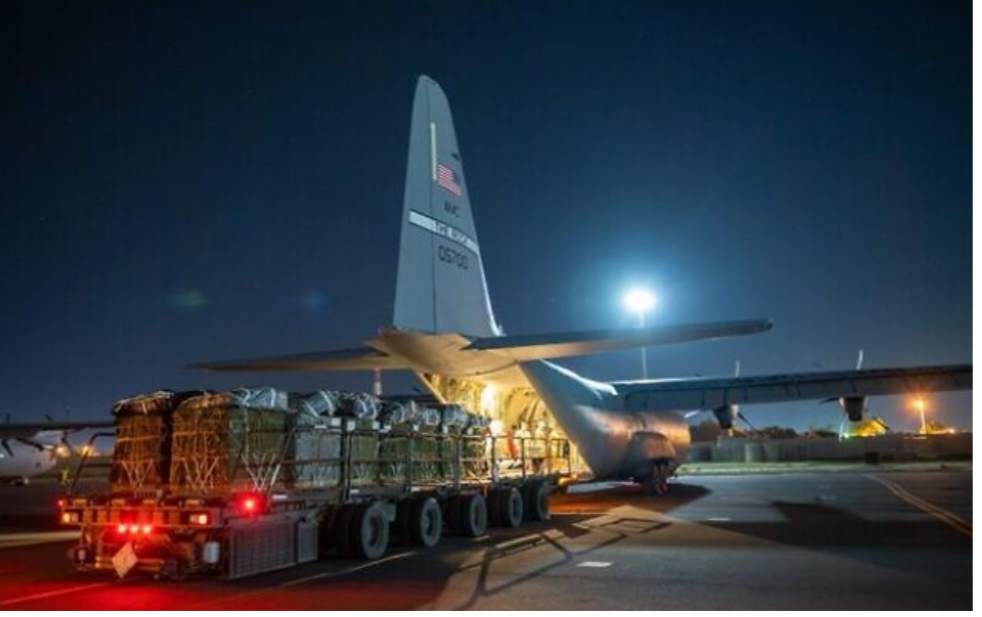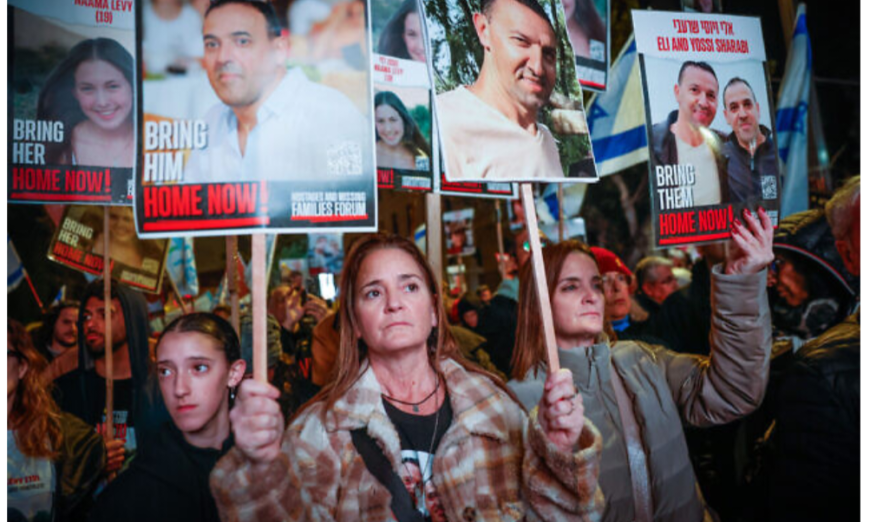Families of the Israelis held kidnapped by Hamas terrorists in Gaza and their supporters protest for the captives’ release in Jerusalem, March 2, 2024. (Chaim Goldberg/Flash90.)
With delegations preparing for another round of negotiations, IDF says it hit some 50 targets belonging to the terror group in western Khan Younis overnight.
March 3rd. 2024. A senior Hamas official claimed on Sunday that a ceasefire in Gaza could be secured within “24 to 48 hours” if Israel were to accept the terror group’s demands in ongoing talks, which have reportedly stalled as Hamas refuses to provide Israel with a list of hostages who are still alive.
“If Israel agrees to Hamas demands, which include the return of displaced Palestinians to northern Gaza and increasing humanitarian aid, that would pave the way for a (truce) agreement within the next 24 to 48 hours,” the unnamed Hamas official told AFP as a delegation of its officials arrived in Cairo for talks on a potential temporary truce and hostage deal.
The official added that Hamas had demanded the entry of “at least 400 to 500 trucks per day” carrying food, medicine and fuel as part of a truce deal.
The Hamas official’s claim that Israel is the party responsible for delaying the elusive deal contradicted comments by a senior US official, who said on Saturday that Israel had agreed to the framework for a six-week pause in fighting, which now depended on Hamas agreeing to release the hostages.
An Israeli delegation was expected to arrive in the Egyptian capital later on Sunday as well, although a source briefed on the talks reiterated that Israel would not send a team until it received the list of live hostages it demanded.
Despite charging that Israel’s unwillingness to accept the terror group’s demands was the reason a deal hasn’t progressed, a Hamas official told the UK-based Qatari outlet Al-Araby Al-Jadeed that it will not provide any further details on the hostages without Israel paying a “big price” for it.
“A big price must be paid in terms of alleviating the suffering of the people of Gaza and establishing a ceasefire,” he told the news outlet, signaling that the group was not prepared to accede to the demand.
The Hamas delegation to Cairo is being led by senior leader Khalil al-Haya, an unnamed source told AFP.
“The delegation will meet Egyptian mediators and deliver the group’s response to the new Paris proposal,” the source said, in reference to negotiations held last month in the French capital with Israel’s presence.
Also said to be in attendance are delegations from the United States and Qatar.
Hope of a successful deal as a result of the ongoing negotiations rose last week following a previous round of talks mediated by Qatar and Egypt in Doha, and cautious indications from US President Joe Biden that an agreement was close. On Friday, however, Biden acknowledged that a deal remains elusive for now, but said he still hopes it will be finalized by the Muslim holy month of Ramadan, which will start on March 10 or 11, depending on the lunar calendar.
Should a deal be reached, it would be the second of its kind since the terror onslaught carried out by Hamas in southern Israel on October 7. The first was a weeklong truce in late November that brought about the release of 105 civilians from Hamas captivity in exchange for 240 Palestinian security prisoners.
It is believed that 130 hostages abducted by Hamas on October 7 remain in Gaza — not all of them alive — after the November truce and the release of four other hostages prior to it.
Three hostages have been rescued by troops alive, and the bodies of 11 hostages have been recovered, including three mistakenly killed by the military. The IDF has confirmed the deaths of 31 of those still held by Hamas and one more person has been listed as missing since October 7, and their fate is still unknown.
Hamas is also holding two Israeli civilians, Avera Mengistu and Hisham al-Sayed, who are both thought to be alive after entering the Strip of their own accord in 2014 and 2015, respectively, as well as the bodies of fallen IDF soldiers Oron Shaul and Hadar Goldin since 2014.
The Hamas-run health ministry in Gaza said on Sunday that the death toll in the war had surpassed 30,400 people, with an additional 71,700 people having been injured.
The terror group’s figures are unverified, don’t differentiate between civilians and combatants, and list all the fatalities as caused by Israel — even those believed to have been caused by hundreds of misfired rockets or otherwise by Palestinian fire.
Israel has said it killed some 13,000 Hamas members in Gaza fighting, in addition to some 1,000 killed in Israel in the aftermath of the terror group’s invasion and massacre of some 1,200 people.
On Sunday, the IDF said that it had carried out a wave of airstrikes against some 50 Hamas targets in western Khan Younis within just six minutes overnight in order to enable ground troops of the 98th Division to maneuver into new areas of the city in the southern Gaza Strip.
According to the IDF, the targets included underground infrastructure, buildings used by Hamas, anti-tank launch positions, booby-trapped buildings, and staging grounds where operatives were gathered.
After the wave of strikes, the 98th Division “began a surprise assault on the area, during which the troops raided terror targets and eliminated terrorists,” the IDF said, and added that intensive fighting was ongoing on Sunday morning.
Meanwhile, in central Gaza, the IDF said the Nahal Brigade killed dozens of Hamas operatives over the past day, some of them by calling in airstrikes, and captured weapons.
Following a deadly incident in northern Gaza on Thursday in which more than 100 Palestinians were reportedly killed and hundreds more wounded while swarming aid trucks in Gaza City, IDF spokesman Rear Adm. Daniel Hagari reiterated on Sunday the IDF’s commitment to ensuring that civilians in hard-to-reach areas of Gaza have access to humanitarian aid.
In an English-language video statement, Hagari said that the IDF coordinated a total of 21 airdrops in the Gaza Strip in recent weeks, carried out by the United States, Jordan, France, the UAE, and Egypt.
Between the countries, more than 450 packages of food and medical aid were dropped over the Strip and distributed to civilians in need. The latest airdrop was carried out on Saturday by the US and Jordan.
Three Biden administration officials confirmed after the airdrop that the planes had distributed military “meals ready to eat” (MREs) in locations that were thought would provide civilians with the greatest level of safety to access aid. Afterward, the US monitored the sites and was able to see civilians approach and distribute food among themselves, according to the officials, who spoke on the condition of anonymity to provide additional details that had not been made public.
“We will continue expanding our humanitarian efforts to the civilian population in Gaza while we fulfill our goals of freeing our hostages from Hamas and freeing Gaza from Hamas,” said Hagari.

Aid for Gaza is loaded onto a US Air Force cargo plane ahead of an airdrop over the enclave, March 2, 2024. (US Central Command photo.)

